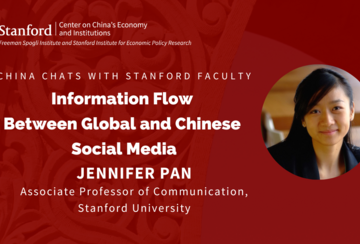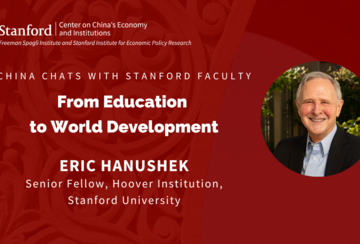
On November 15, 2023 Albert Park, Chief Economist of the Asian Development Bank (ADB), joined SIEPR, SCCEI, and the King Center on campus for a timely discussion on China’s economy and Asia’s rise.
We sat down with Professor Jennifer Pan to learn more about her journey to becoming a leading scholar on political communication and authoritarian politics and her recent research on information flow in China.

China was once the most technologically advanced civilization in the world. But China’s technological development stalled, stagnated, and eventually collapsed and its early technological leadership did not set the country on a modernization path. MIT Professor Yasheng Huang joined SCCEI and Stanford Libraries to deliver a talk examining the factors behind the rise and the fall of Chinese historical technology and lessons for today’s China.

SCCEI Co-Director Scott Rozelle joined a select group of ten academics from the U.S. to participate in a Track Two diplomacy effort between the U.S. and China. Together, they traveled to Beijing where they met with 12 scholars from China to discuss the current state of scholarly exchange between the two countries, as well as strategies to improve it.
SCCEI is pleased to announce the formation of the SCCEI Faculty Steering Committee. The committee consists of our two co-directors, Hongbin Li and Scott Rozelle, as well as three esteemed faculty members, Grant Miller, Jennifer Pan, and Xueguang Zhou.
This summer eight Stanford graduate students will advance their empirical research on China with financial support from the Stanford Center China’s Economy and Institutions.

In December 2022, Zhenan Bao, Professor of Chemical Engineering at Stanford University, spoke about her journey to becoming a renowned chemical engineer and innovator and her passion for mentoring the next generation of innovators.

Dr. Susan Shirk joined Stanford Libraries and the Stanford Center on China’s Economy and Institutions as the featured speaker of the 2022 Dr. Sam-Chung Hsieh Memorial Lecture.

US-China Business Council President Shares Insights on US-China Relations in Private Roundtable
SCCEI hosted a private roundtable discussion with the president of the US-China Business Council, Craig Allen, and a select group of Stanford faculty and business leaders, discussing technology competition and the shifting business environment between the US and China.
Stanford Senior Fellow Eric Hanushek joined SCCEI for a conversation on his research looking at the worldwide progress of achieving the UN's Sustainable Development Goals. Hanushek compares different countries' PISA scores and incomes in effort to answer the following questions: Who is competitive? How do labor skills affect development? How skilled is China?

MIT professor Yasheng Huang joined SCCEI for a conversation on the fundamentals of U.S.-China relations and shared his thoughts on how the U.S. can disrupt current bilateral tension and advocated for more data-based, factual, and analytical discussions on China.

Stanford professor Jennifer Pan joined SCCEI for a conversation on her new research looking at information flow from the U.S. to China via social media during the COVID-19 pandemic.

The SCCEI China Briefs are short features that translate top-quality academic research into evidence-based insights for those interested in China and U.S.-China relations. Released twice a month, the briefs will cover timely issues that inform policy and advance the public understanding of China and its role on the global stage.
SCCEI welcomed six postdoctoral scholars to the team this year. We spoke with each of them to learn more about them and their research interests.

The Summer of 2021: Consolidation of the New Chinese Economic Model with Professor Barry Naughton
During the summer of 2021, a “regulatory storm” shook markets in China. While the crackdown had its most immediate effects on private education, internet business, and finance, the government has also rolled out new policies to shape manufacturing and infrastructure, and even household fertility and income distribution.
Stanford Center on China’s Economy and Institutions (SCCEI) Co-Directors Scott Rozelle and Hongbin Li hosted a “Faculty Meet & Greet” event to introduce the academic community to the work they will be doing under the new center. They were joined by 9 Stanford faculty affiliates who briefly presented their research projects within SCCEI's 6 flagship research initiatives.

What a child hears before age 3 has a profound impact on their language skills development and long-term outcomes. However, little evidence exists on the language environment in which migrant children grow up. New research and technology offer a glimpse into the home language environment of migrant children in the rapidly urbanizing city of Chengdu.
In their newly released book, Scott Rozelle and Natalie Hell explore how the great disparity in human capital across rural and urban China is inhibiting China’s rise from a middle-income to a high-income country. We sat down together to learn more about the invisible economic challenge China faces.








